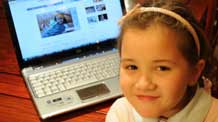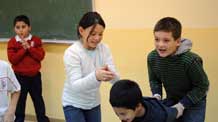Gaza Children Survive with Psychological Trauma and Hard Living Conditions
Adjust font size:
Amid the hard living conditions that 1.5 million people of the blockaded and impoverished Gaza Strip endure, Nada Joma'a, a girl with one leg, and Yasser al-Za'eem, a boy with a dream and love of computers, are struggling to exist and live to tell the tale.
It was hard for the 14-year-old girl from Sheikh Radwan neighborhood in northern Gaza City to forget the scenes when an Israeli missile destroyed her house, killed her mother and injured her leg during the 22-day Israeli military offensive on the Gaza Strip at the beginning of the year.
Meanwhile, the 14-year-old boy, who is from the impoverished Shatti refugee camp in western Gaza City, spent his time sitting in front of a cheap computer in his room and chatting with friends from other countries through a slow Internet server.
Nada doesn't like to leave her house because she feels shy as people could see her with one leg, and Yasser prefers to stay at home in order to keep in contact with his friends and relatives outside the Gaza Strip. They are concerned they will never see the situation in Gaza improve.
"It's the hardest memories I have ever had in my life. I can't forget the scene when the missile hit our house, the huge explosion, the dust; the smoke and the rubble were on our heads. I can't forget when I saw my mother was dead, my sister and my brother wounded and I also lost my leg," said Nada.
Yasser, who has never been out of Gaza since he was born in the refugee camp, said he has a large network of ties and relationships on the Internet with relatives and friends in the West Bank and in other countries. "For me, the web is the rare window to defy the ongoing siege," he told Xinhua.
Surfing the Internet has become the only means of entertainment, not only for Yasser but also for most of his friends at his age. It's a place to meet new friends, read different websites and play games. They believe that it's the only way to break the tight, three-year Israeli blockade imposed on the Gaza Strip.
The clever boy said he began to learn how to use a computer five years ago. When he learned that some of his neighbors and relatives had computers, he begged his father, a poor employee, to buy him and his brothers a Compaq computer.
Now, Nada goes to school in the morning, does her homework or studies in her room in the afternoon. Still looking gloomy and sad, she often goes deep into the past suddenly, remembering the horrible moments.
Though Nada doesn't talk much, she tries to draw a smile, which is usually mixed with sadness. She keeps repeating: "It was a painful and a difficult day." Her father, Jamal Joma'a, said Nada was still suffering from memories.
"She suffers from nightmares at night and during the day she just keeps recalling and recalling in detail what happened. She is always silent," said the father, who said he can't forget the moment either.
Computers, smuggled into the Gaza Strip through underground tunnels, sell for between US$500 and 2,000 apiece.
"When I used the computer for the first time, I was completely ignorant of how to use it," said Yasser, adding that "after five years, I can say I'm a little expert in computers and know how to surf the web, which turned the universe into a little village. Simply put, to me, the computer is so necessary and essential."
Although suffering from poverty and unemployment, many families of the narrow impoverished enclave have a computer. Electronics dealers say the demand has mounted after computer prices declined.
Nada's father said: "It was the second day of the New Year. I went to buy some food and when I came back home, the Israeli planes fired a rocket at my house. I rushed inside, and I saw smoke and dust filling the entire house while my family was sinking into a lake of blood."
He added that he found his wife dead, still embracing their little infant who was also hurt, while Nada and her younger sister, Dalia, 10, were on the floor beside their mother. "I thought that all of them were dead until Nada screamed when she saw me and said 'Baba we are here.'"
Rescue teams and ambulances arrived at the house, took the dead mother and her three children to the hospital. Nada's leg was in very bad shape and it was hard for the doctors to save it, so the father said with a suffocated voice as tears fell, "the only choice was to cut her leg to save her life."
The father said he sometimes suggested to Nada she should go to visit her friends or play with their neighbors, but she refused because all her friends are normal. "She always stands in front of the mirror looking at the shape of her body and keeps crying."
Nada spends all her time not only studying, but looking around inside her room at the walls, at the windows and at the ceiling. She keeps looking at a picture of her mother hung on the wall, talks to her and cries. The father said: "I tried to help her, but what can I do, I really don't know."
Different surveys show the psychological status of Gaza children, who represent half of the 1.5 million population of the entire Gaza Strip, would continue for several years.
Official Palestinian figures say more than 350 out of the 1,440people killed during the Israeli assault and 1,872 of the roughly 5,300 injured were children. Around 500 children have been left physically disabled.
Eyad al-Saraj, who runs the Gaza Mental Health Program, said children now "are unable to practice their natural childhood. They don't feel happy and they don't see hope. On the contrary, a culture of death and blood has affected their mentalities."
He added that the continuation of such a situation for Gaza Strip children, who have a feeling of insecurity "means that a complete generation of children will grow up to form groups of militants who will be more violent and more fanatic."
Nada's sister, Dalia, who suffered injuries to her abdomen, has recovered after a long treatment, but she is also suffering psychological problems. The sisters said the hardest scene that they couldn't forget was that of the body of their mother laying on the ground.
Biting her nails and sitting on a sofa in the house hall, Dalia said she saw her mother every night in her dreams. "I always asked Mama to come back home, but she told me she can't because she is living now in paradise, so I told her come and take me to live with you."
(Xinhua News Agency November 22, 2009)





